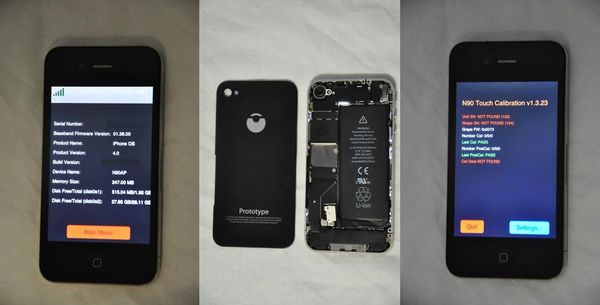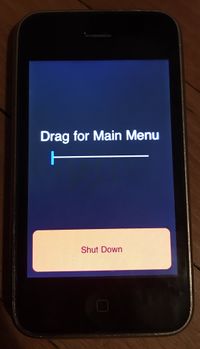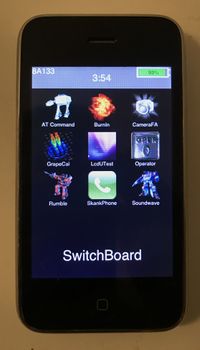|
The iPhone Wiki is no longer updated. Visit this article on The Apple Wiki for current information. |
Difference between revisions of "Apex 8A133"
Orangera1n (talk | contribs) |
m (added kernel version) |
||
| Line 8: | Line 8: | ||
This build is known to contain kernels for the Apple A4 processor, as well as those found in the iPhone 3GS, iPhone 3G / original iPhone, iPod Touch (Second and Third generation). Interestingly, it also contains kernels for an unused processor - the MV88F6281, an ARMv5 compatible processor, with the custom Sheeva core at its heart. It is speculated that this processor could have something to do with the unreleased N89 prototype. |
This build is known to contain kernels for the Apple A4 processor, as well as those found in the iPhone 3GS, iPhone 3G / original iPhone, iPod Touch (Second and Third generation). Interestingly, it also contains kernels for an unused processor - the MV88F6281, an ARMv5 compatible processor, with the custom Sheeva core at its heart. It is speculated that this processor could have something to do with the unreleased N89 prototype. |
||
| + | |||
| + | This firmware has the kernel version <code>Darwin Kernel Version 10.2.1: Wed Nov 4 22:08:02 PST 2009; root:xnu-1504.1.18~3/DEVELOPMENT_ARM_S5L8930X</code>. |
||
Since this build is fairly early, it provides more insight into the user interface of previous NonUI builds - mainly 3.X-based versions. Because of this various features and UI elements are specific to this version of 4.0 as they have either been replaced, removed or phased out with later versions. |
Since this build is fairly early, it provides more insight into the user interface of previous NonUI builds - mainly 3.X-based versions. Because of this various features and UI elements are specific to this version of 4.0 as they have either been replaced, removed or phased out with later versions. |
||
Revision as of 06:25, 13 March 2021
This article discusses software internally used by Apple. Acquiring a copy without Apple's consent is illegal and may result in being scammed. |
Background
This is an early build of iOS 4.0 that was on the famous Deathstar iPhone prototype. It can be seen in action here, with a custom backplate and running this firmware, 8A133. Notably, it contains files referencing an unreleased device bearing the codename - N89. It also has a variety of diagnostic images, including one for the iPod touch (3rd generation). The root filesystem is known to be somewhat larger than 500MB.
This build is known to contain kernels for the Apple A4 processor, as well as those found in the iPhone 3GS, iPhone 3G / original iPhone, iPod Touch (Second and Third generation). Interestingly, it also contains kernels for an unused processor - the MV88F6281, an ARMv5 compatible processor, with the custom Sheeva core at its heart. It is speculated that this processor could have something to do with the unreleased N89 prototype.
This firmware has the kernel version Darwin Kernel Version 10.2.1: Wed Nov 4 22:08:02 PST 2009; root:xnu-1504.1.18~3/DEVELOPMENT_ARM_S5L8930X.
Since this build is fairly early, it provides more insight into the user interface of previous NonUI builds - mainly 3.X-based versions. Because of this various features and UI elements are specific to this version of 4.0 as they have either been replaced, removed or phased out with later versions.
Notable Characteristics
- GrapeCal opens to a screen that is similar to Reliability, in that the user must drag a slider. It is labeled, "Drag for Main Menu." This feature seems to have been carried over from pervious builds (3.X) and has been removed from later versions.
- Besides the standard "Calibrate" button in GrapeCal there is a second button labeled "PostCal", apparently used to launch post calibration tests. This feature has also been removed from subsequent versions. It is accessible even when the calibration UI is hidden on certain devices.
- The Terminal functionality in SkankPhone is operational.
- The BurnIn application does not automatically boot into Inferno. Instead, the application runs selected tests whilst displaying its own UI - featuring a spinner whilst the tests are being performed, as well as a timer that measures how long the test has been running. Upon completion the user will be greeted with either a green screen, notifying that the test was completed successfully, or a red screen indicating failures, which are also numbered. In both cases the user is instructed to collect logs. This UI is not found in later firmwares.
- This build also features Inferno debug backgrounds.
Applications
Upon booting up, SwitchBoard.app lets you choose from the following:


